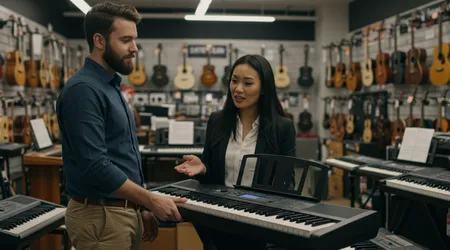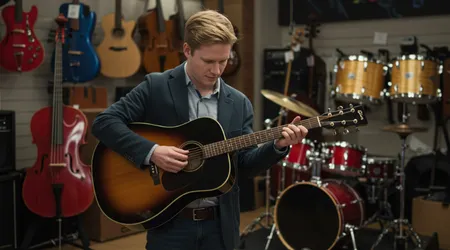Complete Guide on How to Choose Your First Musical Instrument

Choosing your first musical instrument It is an exciting yet challenging step that marks the beginning of a journey of discovery and expression.
Advertisements
Music, a universal language, connects emotions, cultures, and stories, and choosing the right instrument can transform curiosity into lasting passion.
This detailed guide is designed to help beginners, parents, and enthusiasts make an informed decision based on their personality, goals, budget, and context.
With a music market constantly evolving in 2025, the global musical instrument industry is worth around US$1.4 billion, according to IBISWorld, there have never been so many options.
Here, we explore with intelligence and clarity how to make that choice with confidence, offering practical tips, real-world examples, and up-to-date insights.
Advertisements
The decision goes beyond simply buying an instrument. It involves understanding what resonates with you, the space available, the time to practice, and even the emotional impact of the music.
Why choose now?
Because music, in addition to being a hobby, is a tool for cognitive and emotional development, proven by studies such as the one from the University of Cambridge (2020), which revealed that children who play instruments have better academic performance.
Let's dive into this process with a guide who balances emotion, logic, and practicality, ensuring your choice is as unique as your story.
Understand Your Motivation and Musical Style
The journey to choosing the first musical instrument It starts with self-awareness. What's your goal? Playing for fun, joining a band, or pursuing professional training?
Identifying this sets the stage. If you love the vibrant sound of rock, an electric guitar might be ideal. A piano, on the other hand, appeals to those seeking classical or pop versatility.
Think about the musical style that inspires you. Do you like jazz? A saxophone might be the way to go. Do you love Brazilian Popular Music? An acoustic guitar is an accessible classic.
++ 5 Daily Exercises to Improve Your Rhythm
Motivation guides, but style refines the decision, aligning the instrument with your identity.
Also consider your personality. Extroverts might be captivated by the energy of a drum kit, while introspective people might prefer the delicacy of a flute. Reflect: what sound reflects who you are?

Assess the Space and Context
Your living environment directly influences your choice. A small apartment may not accommodate an acoustic drum kit, which requires space and soundproofing.
A violin, compact, is more practical. Choosing your first musical instrument requires evaluating where it will be played.
Consider noise. Instruments like trumpets are loud and can disturb neighbors. Alternatives like keyboards with headphones offer quiet practice. Consider available storage space.
Consider mobility. If you plan to take the instrument to lessons or performances, something lightweight like a transverse flute is more practical than a double bass. Context shapes the experience.
See more: Learn to Read Sheet Music Without Complications
Consider Budget and Quality
Cost is a crucial factor when choosing the first musical instrument. Instruments range from R$ 200 (recorders) to R$ 5,000 (entry-level digital pianos).
Setting a realistic budget is essential. Brands like Yamaha and Roland offer reliable options for beginners.
Avoid very cheap instruments. Low-quality models can be off-putting, with poor sound or difficulty tuning. Invest in something in between, a balance between price and durability.
See also: Mistakes That Ruin the Sound of Your Instrument
Consider additional costs: lessons, accessories (such as strings or stands), and maintenance. Renting an instrument before buying can be a smart strategy to test it out without breaking the bank.
Ease of Learning and Progress Curve
Not every instrument is equally accessible. The ukulele, with four strings and simple chords, is easier for beginners than a cello, which requires refined technique.
Choosing your first musical instrument involves considering the learning curve.
Instruments like piano and guitar offer clear progression, with simple songs learned in weeks. The oboe or bagpipes, on the other hand, require months to acquire basic sounds. Choose with patience in mind.
Age also matters. Young children may adapt better to lightweight instruments like the ukulele. Adults, with greater coordination, have greater flexibility. Match the instrument to your stage in life.
Try Before You Decide
Nothing replaces practical experience. Before choosing the first musical instrument, visit specialized stores or music fairs, such as Expomusic (if still active in 2025). Playing the instrument reveals whether it "speaks" to you.
Talk to experienced musicians or teachers. They can advise you on the feel of the instrument. For example, the weight of a saxophone can be surprising for beginners. Testing it out will prevent regrets.
If possible, participate in music workshops. Many schools offer trial lessons, allowing you to experience the instrument in action. This practical connection is the heart of the choice.
The Importance of Learning Support and Resources
The musical journey requires support. choosing the first musical instrument, check the availability of teachers or online courses. Platforms like Yousician (currently available in 2025) offer interactive lessons for beginners.
Popular instruments like guitar and piano have a wide range of free tutorials on YouTube and apps. Less common instruments, like the mandolin, may have limited resources. Do your research beforehand.
Local or online communities, such as Reddit forums, connect learners. Choosing an instrument with robust support ensures motivation and continued progress.
Table: Comparison of Instruments for Beginners
| Instrument | Average Price (R$) | Ease of Learning | Required Space | Musical Styles |
|---|---|---|---|---|
| Guitar | 500–1,500 | Moderate | Small | Pop, MPB, Folk |
| Digital Piano | 2,000–5,000 | Moderate | Average | Classical, Pop, Jazz |
| Ukulele | 200–600 | Easy | Small | Folk, Pop |
| Recorder | 50–200 | Easy | Minimum | Classic, Children's |
| Battery | 1,500–4,000 | Difficult | Big | Rock, Jazz, Funk |
Source: Data based on average prices from Brazilian retailers in 2025, such as MadeiraMadeira and Americanas.
Practical Examples: Stories that Inspire
Imagine Ana, a 15-year-old girl passionate about indie rock. She chose a ukulele after trying it out in a store. Why?
It was light, accessible, and perfect for covers of her favorite bands. Within three months, Ana was playing Billie Eilish songs, proving that choosing the first musical instrument can be quick and rewarding.
Now, think about João, a 35-year-old adult who has always dreamed of jazz.
He opted for a MIDI keyboard, which connects to his computer, to learn with apps. His choice reflects how technology and passion can come together in 2025.
The Role of Technology in 2025

Technology has transformed the way we choosing the first musical instrument.
Apps like Simply Piano use artificial intelligence to correct notes in real time. Hybrid instruments, like guitars with built-in tuners, make learning easier.
Augmented reality is also gaining traction. AR glasses, like Meta's, project tutorials directly onto the instrument, guiding beginners. The technology doesn't replace practice, but it does accelerate progress.
Choosing a technology-connected instrument, such as a digital piano with MIDI, can be ideal for those seeking innovation. Music, after all, evolves over time.
An Analogy to Ponder
Choosing your first musical instrument It's like choosing a travel companion. A guitar can be a laid-back friend, perfect for lighthearted adventures.
A piano, more demanding, is like a wise guide, demanding dedication but revealing grand destinations. Which companion suits your journey?
Conclusion: The First Step of a Great Journey
Choosing your first musical instrument It's more than a purchase; it's a commitment to personal expression and growth.
Every note you play is a step toward self-discovery, connecting you to a global community of musicians.
In 2025, with so many options and resources, from interactive apps to affordable instruments, getting started has never been easier.
Reflect on your tastes, test, research, and invest wisely. The music awaits you; what will the sound of your story be? Start today, with confidence, and let your passion soar.
Frequently Asked Questions
1. What is the best instrument for beginners?
There's no universal "best." Guitars and ukuleles are popular for their affordability and ease. Consider your musical style and budget.
2. Can I learn on my own with online tutorials?
Yes! Platforms like Yousician and YouTube offer free lessons. A teacher, however, accelerates progress and corrects mistakes.
3. How much should I spend on my first instrument?
Between R$ 200 and R$ 2,000, depending on the instrument. Avoid very cheap models, which can compromise quality.
4. Can children learn any instrument?
It depends on age and size. Recorder and ukulele are ideal for young children; piano is versatile for all ages.
5. How do I know if I will like the instrument?
Try before you buy! Visit stores or take trial lessons to feel the connection with the instrument.
